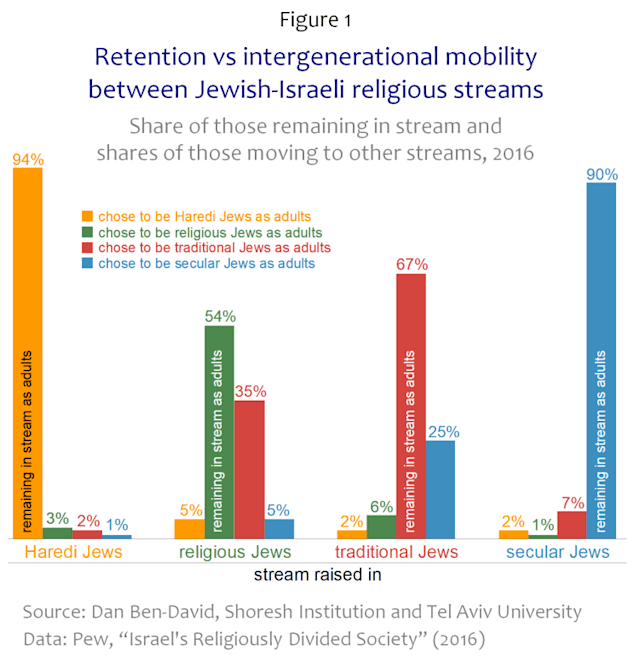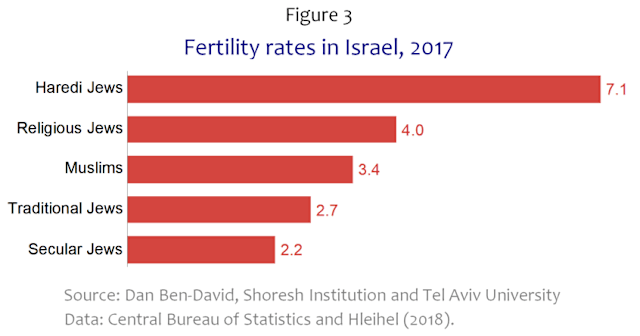
(photo credit: Courtesy)
Israel ‘under threat’ by lack of basic education for ultra-Orthodox children
Prof. Dan Ben David predicts that by 2065, some 35% of Israel’s population will be ultra-Orthodox, compared to its current level of 9% of the population.
Israel is headed for an existential crisis due to the ultra-Orthodox community’s high birthrate, its ability to retain the members of its sector within the ultra-Orthodox fold, and the failure of schools in the sector to provide their pupils with a basic education, a think-tank has argued in a new policy brief.
The brief, authored by Prof. Dan Ben-David of the Shoresh Institution for Socioeconomic Research, contends that Israel needs to forget its earlier demographic concern about maintaining a Jewish majority, and instead focus on the severe challenges that it will face over the next half a century, during which time the ultra-Orthodox share of the population will more than triple.
That only a tiny percentage of male ultra-Orthodox high school pupils study the core curriculum subjects such as math, English and science means that Israel’s economy in the future will be unable to sustain its needs for a modern, effective army, Ben-David argues.
According to his findings, some 94% of those who grow up in the ultra-Orthodox community remain ultra-Orthodox as adults.
Of the remainder, 3% become religious-Zionists, 2% become religiously traditional and 1% become secular.At the other end of the spectrum, secular Israelis also have a high rate of retention of their community, with only 10% of those born secular joining another sector of the population as adults.
According to Ben-David’s study – which uses statistical data from the Central Bureau of Statistics – ultra-Orthodox women have an average birthrate of 7.1 children, compared with just 2.2 for secular Jews, 2.7 for religiously traditional Jews and 4.0 for religious-Zionist Jews. The average birthrate for Muslim women is 3.4 children.
Although the religious-Zionist sector also has a high birthrate, it has low rate of retention of its members, with 45% of its community dropping out of the sector, most of whom become religiously traditional.
According to these figures, Ben-David predicts that by 2065, some 49% of all children in Israel aged 0 to 14 will be ultra-Orthodox, compared with their current level of 19%.
The policy brief notes that the overwhelming majority of male ultra-Orthodox high school aged pupils do not study any core curriculum subjects such as math, English and the sciences.
These pupils, both Ashkenazi and Sephardi, mainly attend what are called yeshivot ketanot and yeshivot gedolot, the equivalent of middle and high school, where only religious studies are taught.
It is estimated that some 80% of male Ashkenazi ultra-Orthodox elementary-age pupils attend schools where a minimal core curriculum is taught, although even then it is believed that the requisite hours are not fully taught, and when they are it is to a poor standard.
The Shas-run school network Maayan Hinuch Torani does teach core-curriculum studies, with some 80% of male Sephardi ultra-Orthodox pupils studying in such schools. But the level of these studies is also not thought to be of a high standard.
Efforts to reform primary education in the ultra-Orthodox sector and ensure that schools teach core curriculum subjects were taken by former education minister Shai Piron of Yesh Atid, but various problems, including strong opposition by the ultra-Orthodox parties, meant that most of the reforms were either not implemented or subsequently reversed.
The notion of enforcing the teaching of core curriculum subjects in the yeshivot ketanot and gedolot that ultra-Orthodox boys attend in lieu of high school was not even broached, since the reaction by the ultra-Orthodox leadership and the general population would be so severe.
Ultra-Orthodox girls generally do study the core curriculum since many are expected to support their future husbands economically while they study full-time in yeshiva.
As such, ultra-Orthodox women have a far higher rate of obtainment of higher education qualifications than men, and also have a far higher rate of employment than ultra-Orthodox men.
BEN-DAVID POINTS out that despite recent increases in the number of ultra-Orthodox men and women studying for academic degrees in colleges and universities, the share of working age ultra-Orthodox men with such qualifications has remained the same over the last 15 years, at around 15%, and even declined slightly over the last four years.
Since it is ultra-Orthodox men who have extremely low rates of workforce participation, with just 51% in employment, the figures regarding the failure to increase the share of ultra-Orthodox men with higher education qualifications is of particular concern.
To continue reading click here.

